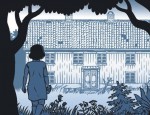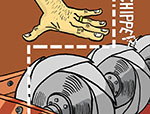566 Frames takes an approach to storytelling that is not only unique and innovative, but at the same time universal and timeless.
You may have heard about stories coming from beyond the grave… but how about from inside the womb? That’s the premise of Dennis Wojda‘s English language debut 566 Frames, a story of endings and beginnings, history and living in the moment, recognising your past and looking forward to the future. It tells the stories of Wojda‘s predecessors, including aunts, grandparents, great-grandparents, great-great-grandparents, and of course his own mother and father. Their stories span history, war, romance, adventure and jazz music in a meandering but not chaotic selection of tales and are told by the author’s point of view, in the build-up to his birth and as his mother drives madly to the hospital.
 For a book that contains the harsh brutalities of war, fighting, bombs and rage 566 Frames is a surprisingly gentle graphic novel. The whole book is a reflection, a look back through the hazy mists of time in an exploration of what brought the author to where he is – and who he is – right in the here and now. 566 Frames began life as a comic blog, the narrative slowly developing over time and discovering these stories at much the same time as his audience did. From that it’s gained a sense of spontaneity, mimicking with ease the natural shifts of thought and storytelling in a way that’s usually extremely difficult to pin down.
For a book that contains the harsh brutalities of war, fighting, bombs and rage 566 Frames is a surprisingly gentle graphic novel. The whole book is a reflection, a look back through the hazy mists of time in an exploration of what brought the author to where he is – and who he is – right in the here and now. 566 Frames began life as a comic blog, the narrative slowly developing over time and discovering these stories at much the same time as his audience did. From that it’s gained a sense of spontaneity, mimicking with ease the natural shifts of thought and storytelling in a way that’s usually extremely difficult to pin down.
From the 1944 Warsaw uprising to the possibly psychic, barefoot great-grandmother running away with the love of her life, they are the sorts of stories that we all recognise on some inherent level – that kind of patchwork of history, love, loss and tall tales that makes up every family’s history. The sort of stories an elderly aunt might spin at a family gathering, laughter lines creasing as she gives a knowing smile. Except of course, in this case the narrator is not a kindly relative but an unborn comics artist. Same principle though.
The calming palette of monochromatic blue softens the tragic to the melancholy and the visceral to the contemplative and the basic style of line drawing creates a simplistic clarity that belies its subtlety. Much as is suggested by the title, the pages consist of single frames laid out in a winding narrative through time and space – two frames to a page, one below the other. It’s a strangely disconnected way to tell a story. Each frame is clearly separate from the ones directly preceding and following it and often of a completely different scene – or generation. Despite that, the plot (in the sense that there is a plot) is coherent and flows naturally, Wojda’s small but charming drawings manage to each capture the mood of the moment perfectly, and though quite a bit of expositional text is required to explain the context of the scenes it is still the character of the drawings that is leading the graphic novel.
 566 Frames takes an approach to storytelling that is not only unique and innovative, but at the same time universal and timeless. Its cast of family characters are colourful, identifiable and (especially the author’s own mother) pretty feisty at times. It’s a book that may well inspire you to have a dig into your own family history, and in the end, it’s a book that will make you smile.
566 Frames takes an approach to storytelling that is not only unique and innovative, but at the same time universal and timeless. Its cast of family characters are colourful, identifiable and (especially the author’s own mother) pretty feisty at times. It’s a book that may well inspire you to have a dig into your own family history, and in the end, it’s a book that will make you smile.
Dennis Wojda (W/A) • Borderline Press, £15.95, October 2013











